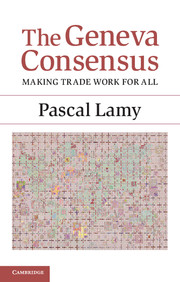Book contents
- Frontmatter
- Contents
- Preface
- 1 Harnessing globalization amid the crisis facing multilateralism
- 2 The changing face of trade
- 3 Helping the poorest up the prosperity ladder
- 4 Trade: friend not foe of the environment
- 5 Trading towards global food security
- 6 Trade can contribute towards better health
- 7 Trade and labour: separated at birth, but still connected
- 8 Trade and energy: the case for a greater WTO role
- 9 Trade and currencies: trading community seeks greater currency stability
- 10 Trade and competition: fairer competition makes for fairer trade
- 11 Trade and human rights: a case of misplaced suspicion
- 12 Corruption: a cancer that trade transparency can help to treat
- 13 Last but not least: the Doha Round
- Epilogue
- Index
5 - Trading towards global food security
Published online by Cambridge University Press: 18 December 2013
- Frontmatter
- Contents
- Preface
- 1 Harnessing globalization amid the crisis facing multilateralism
- 2 The changing face of trade
- 3 Helping the poorest up the prosperity ladder
- 4 Trade: friend not foe of the environment
- 5 Trading towards global food security
- 6 Trade can contribute towards better health
- 7 Trade and labour: separated at birth, but still connected
- 8 Trade and energy: the case for a greater WTO role
- 9 Trade and currencies: trading community seeks greater currency stability
- 10 Trade and competition: fairer competition makes for fairer trade
- 11 Trade and human rights: a case of misplaced suspicion
- 12 Corruption: a cancer that trade transparency can help to treat
- 13 Last but not least: the Doha Round
- Epilogue
- Index
Summary
Global food security, understood as adequate and safe supplies of food, and managing the double-edged sword of high world food prices is also an area requiring coherent international and domestic agricultural policies. While higher food prices can benefit farmers, they endanger the food security of vulnerable consumers. Remember that combating hunger and poverty is top of the UN’s Millennium Development Goals (MDG). Tackling hunger and malnutrition needs better production, particularly in Africa, and requires that trade in food flows unhindered from the lands of the plenty to the lands of the less well off. Without action in these two areas, there is a risk that hunger will become even more widespread, with many million more lives at stake.
The irony is that in the 1970s Africa was a net exporter of food and such crises were far less common. Yet within twenty years, Africa had become a net food importer. The reason for this is simple: even at a time of great productivity gains globally, African agricultural production failed to keep pace with the growing population. Between 1960 and 2008, world corn production yields doubled from 2.5 tonnes to 5.0 tonnes per hectare. Yet in Africa, yields stayed stuck at under 2.0 tonnes. Milk production per cow in Africa is a quarter of the global average. It is vital to increase yields. African governments need to reassess policies that have discouraged farmers from staying on the land. Farmers should be offered incentives to use new methods and technologies. It can be done. One needs only to look at Brazil to see that African agriculture can be turned around. Just thirty years ago, Brazil was a net importer of basic foodstuffs. Today, thanks to sound policies and enhanced investment in research and development, Brazil is among the world’s top exporters of wheat, corn, chicken, beef and sugar. Low levels of African agricultural productivity have kept the continent on the sidelines of global agricultural trade.
- Type
- Chapter
- Information
- The Geneva ConsensusMaking Trade Work for All, pp. 68 - 80Publisher: Cambridge University PressPrint publication year: 2013



